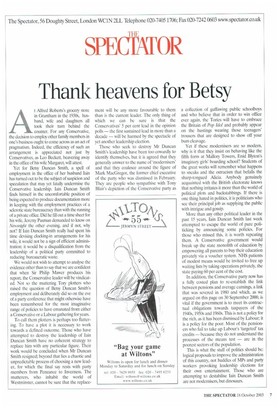Thank heavens for Betsy
t Alfred Roberts's grocery store in Grantham in the 1930 husband, wife and daughters all took their turn behind the counter. For any Conservative, the decision to employ other family members in one's business ought to come across as an act of pragmatism. Indeed, the efficiency of such an arrangement is appreciated not just by Conservatives, as Leo Beckett, beavering away in the office of his wife Margaret, will attest.
Yet for Betsy Duncan Smith, a spell of employment in the office of her husband lain has turned out to be the subject of suspicion and speculation that may yet fatally undermine the Conservative leadership. lain Duncan Smith finds himself in the uncomfortable position of being expected to produce documentation more in keeping with the employment practices of a sclerotic state bureaucracy than with the running of a private office. Did he fill out a time sheet for his wife, Jeremy Paxrnan demanded to know on Newsnight the other evening, and if not, why not? If Lain Duncan Smith really had spent his time devising clocking-in arrangements for his wife, it would not be a sign of efficient administration; it would be a disqualification from the leadership of a political party committed to reducing bureaucratic waste.
We would not wish to attempt to analyse the evidence other than to say that we are confident that when Sir Philip Mawer produces his report, the Conservative leader will be vindicated. Not so the muttering Tory plotters who raised the question of Betsy Duncan Smith's employment and deliberately did so on the eve of a party conference that might otherwise have been remembered for the most imaginative range of policies to have emanated from either a Conservative or a Labour gathering for years.
To call them plotters is perhaps too flattering. To have a plot it is necessary to work towards a defined outcome. Those who have attempted to destroy the leadership of lain Duncan Smith have no coherent strategy to replace him with any particular figure. Their work would be concluded when Mr Duncan Smith resigned; beyond that lies a chaotic and unpredictable process of choosing a new leader, for which the final say rests with party members from Penzance to Inverness. The mutterers, who inhabit the world of Westminster, cannot be sure that the replace ment will be any more favourable to them than is the current leader. The only thing of which we can be sure is that the Conservatives' 5 per cent lead in the opinion polls — the first sustained lead in more than a decade — will be harmed by the spectacle of yet another leadership election.
Those who seek to destroy Mr Duncan Smith's leadership have been too cowardly to identify themselves, but it is agreed that they generally answer to the name of Modernisers' and that they coalesce around the figure of Mark MacGregor, the former chief executive of the party who was dismissed in February. They are people who sympathise with Tony Blair's depiction of the Conservative party as a collection of guffawing public schoolboys and who believe that in order to win office ever again, the Tories will have to embrace the Britain of Pop Idol and probably appear on the hustings wearing those teenagers' trousers that are designed to show off your bum cleavage.
Yet if these modernisers are so modern, why is it that they insist on behaving like the fifth form at Mallory Towers, Enid Blyton's imaginary girls' boarding school? Students of the great works will remember what happens to sneaks and the ostracism that befalls the sharp-tongued Alicia. Anybody genuinely acquainted with the British electorate knows that nothing irritates it more than the world of political plots and backstabbings. If there is one thing hated in politics, it is politicians who see their principal job as supplying the public with intrigue and gossip.
More than any other political leader in the past 15 years, lain Duncan Smith last week attempted to escape the world of pure politicking by announcing some policies. For those who missed this, it is worth repeating them. A Conservative government would break up the state monolith of education by empowering all parents to buy their education privately via a voucher system. NHS patients of modest means would be invited to free up waiting lists by taking operations privately, the state paying 60 per cent of the cost.
In addition, the Conservative party now has a fully costed plan to re-establish the link between pensions and average earnings, a link that was severed in 1980 and which, as we argued on this page on 30 September 2000, is vital if the government is to meet its contractual obligations towards taxpayers of the 1940s, 1950s and 1960s. This is not a policy for the rich, as it has been dismissed by Labour; it is a policy for the poor. Most of the pensioners who fail to take up Labour's 'targeted' tax credits — because they do not understand the processes of the means test — are in the poorest sectors of the population.
This is what the stuff of politics should be: logical proposals to improve the administration of this country, not huddles of MPs and party workers provoking leadership elections for their own entertainment. Those who are attempting to destabilise lain Duncan Smith are not modernisers, but dinosaurs.


































































































 Previous page
Previous page